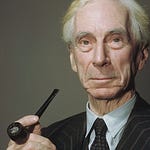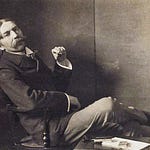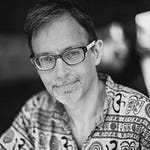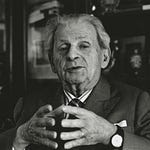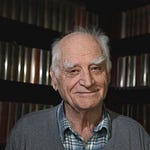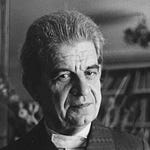Imagine standing at the edge of a precipice, the wind whipping at your clothes, the vast abyss stretching out beneath you. What is that knot in your stomach? Is it the fear of falling? Or is it something far more profound, a chilling realization that you are utterly, terrifyingly free to jump?
This isn’t merely a morbid thought experiment. For Jean-Paul Sartre, one of the 20th century’s most influential existentialist philosophers, this sensation is the very essence of human existence – what he identified as the “dizziness of freedom.” It’s the moment we glimpse the terrifying, unvarnished truth: we are solely responsible for every choice, every action, and ultimately, who we become.
Most of us, however, spend our lives desperately building psychological walls to block out this unsettling view. We engage in a distinctive form of self-deception that Sartre famously called “Bad Faith.” We pretend we are victims of circumstance—locked in jobs we hate, bound by roles we didn’t truly choose, slaves to situations beyond our control. Why? To avoid the crushing anxiety of admitting that we are, in fact, fully responsible for our own misery, our own stagnation, our own freedom.
The Dizziness of Freedom and the Weight of Anguish
That feeling at the cliff’s edge isn’t fear; fear has an object. We fear the fall, the physical harm. But what Sartre points to is a deeper unease: the realization that nothing compels us to stay. Our legs are not merely conduits for gravity; they are instruments of choice. This is anguish.
Anguish, for Sartre, is the existential dread that arises when we confront our radical freedom. It’s the unsettling awareness that in every moment, we are creating our essence through our choices, with no pre-ordained blueprint or divine purpose to guide us. There is no escape from this fundamental responsibility. It is why he famously declared:
Man is condemned to be free; because once thrown into the world, he is responsible for everything he does.
— Jean-Paul Sartre
But what if we could escape? What if we could pretend we aren’t truly free?
The Art of Self-Deception: Living in “Bad Faith”
Enter the realm of “Bad Faith,” Sartre’s term for the distinctive lie we tell ourselves. It’s not simply lying to others; it’s a profound self-deception where we deny our freedom and treat ourselves as fixed objects, devoid of choice. We often adopt roles, not as temporary performances, but as defining characteristics, believing we “are” the role rather than “choose” to play it.
Consider Elias, the accountant. Every morning, he shuffles to his cubicle, crunching numbers, filing reports. He tells himself, and anyone who will listen, that he “is an accountant.” He sees himself as a cog in a machine, bound by the demands of his profession, the expectations of his family, the obligations of his mortgage. He meticulously performs his duties, treating himself like a fixed object—a calculative machine—to escape his own transcendence, his capacity to choose a different path, a different life.
Sartre illustrates this beautifully with his famous example of the waiter. The waiter moves with a certain exaggerated precision, his voice a little too eager, his gestures a touch too theatrical. He is “playing” at being a waiter. In doing so, he tries to become what he performs, effectively turning himself into a tool, a function, rather than a conscious entity freely choosing to fulfill a role. He is trying to become “being-in-itself” (an object) instead of embracing “being-for-itself” (a conscious subject).
This isn’t about shaming; it’s about insight. How many of us hide behind the “responsible provider,” the “dutiful employee,” the “good parent,” precisely to avoid facing the terrifying void of our own potential, our own radical freedom?
The Gaze of the Other and Our Alibis
Our choices, or lack thereof, are also deeply influenced by “The Gaze” of the Other. The way others perceive us, the labels they affix, can become powerful traps. We internalize these external expectations, allowing them to define us and diminish our sense of agency. The expectations of society, family, or even strangers can subtly nudge us into “Bad Faith,” convincing us that we are what others see.
Sartre highlights the paradoxical tension between our “Facticity” and our “Transcendence.” Facticity refers to the concrete facts of our situation: our past, our body, our circumstances. Transcendence is our ability to project ourselves beyond these facts, to choose, to define ourselves anew in every moment. Bad Faith occurs when we prioritize Facticity over Transcendence, telling ourselves, “I can’t because of X,” rather than “Despite X, I choose to Y.”
We are our choices.
— Jean-Paul Sartre
Even the act of not choosing is a choice. To remain silent is to choose silence. To endure a situation is to choose endurance. Every evasion is an affirmation of a particular mode of being. This is the uncomfortable truth behind our alibis: there is always a choice, and we are always responsible.
Unlock deeper insights with a 10% discount on the annual plan.
Support thoughtful analysis and join a growing community of readers committed to understanding the world through philosophy and reason.
Embracing the Void
To choose freedom is to strip away the comforting alibis of social labels and admit that we are fully, terrifyingly responsible for our own existence.
Are you ready to stop hiding behind the “responsible provider” or the “dutiful employee” and face the void of your own potential? Are you prepared to embrace the anguish of freedom, knowing that every choice, every decision, however small, is a profound act of self-creation?
Sartre’s philosophy is not a call to anarchy, but a profound invitation to authenticity. It asks us to look squarely at our freedom, to own our choices, and to understand that in every moment, we are defining ourselves through our actions. It’s a heavy burden, but also the ultimate source of our dignity and meaning.
If this exploration of freedom and responsibility resonates with you, please subscribe and share your thoughts in the comments below. Let’s continue this conversation.




